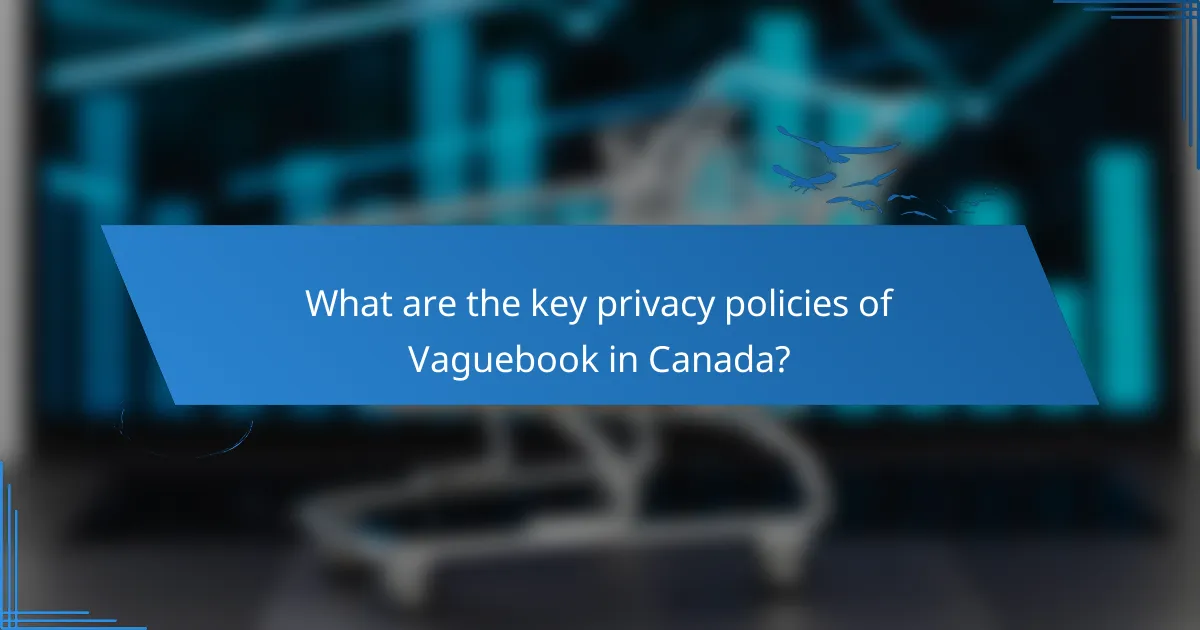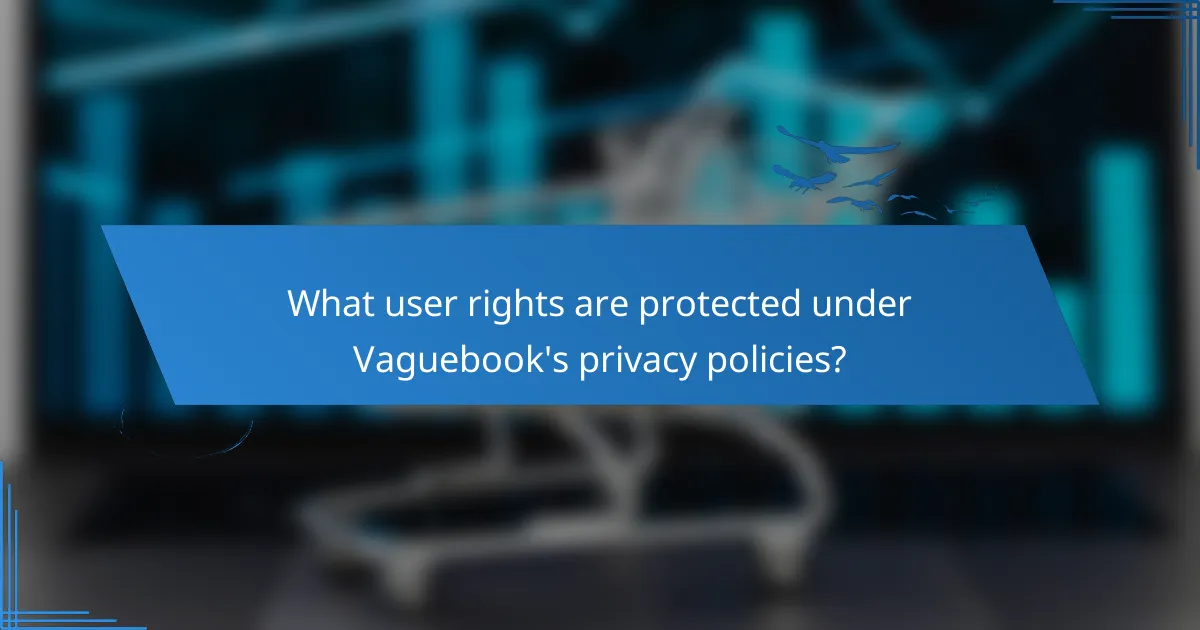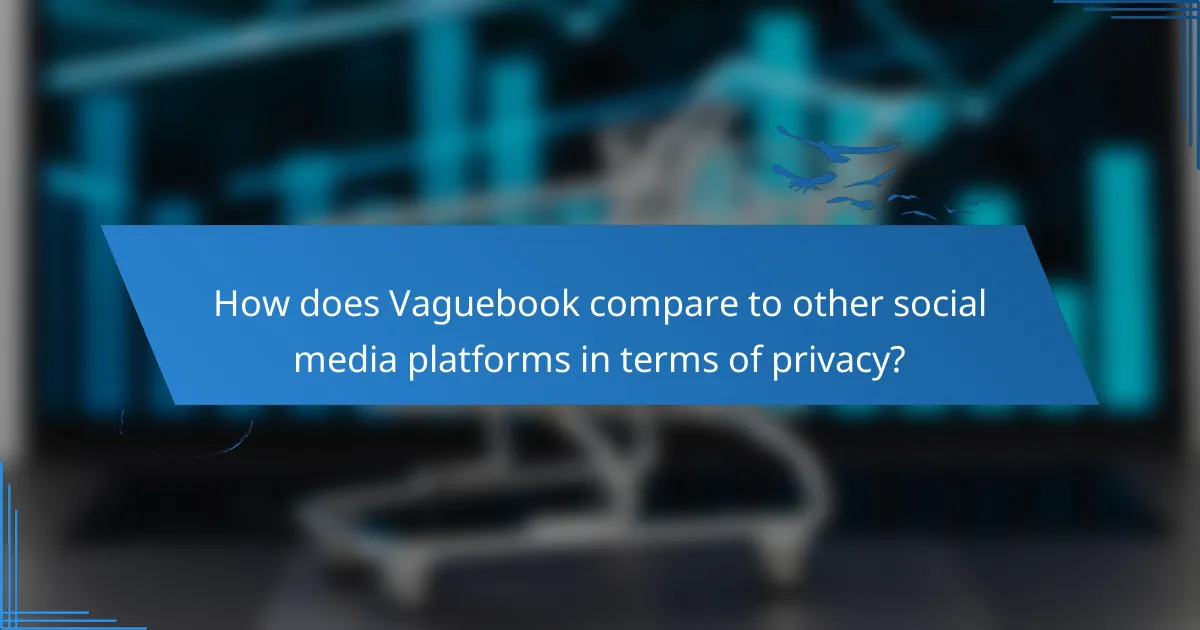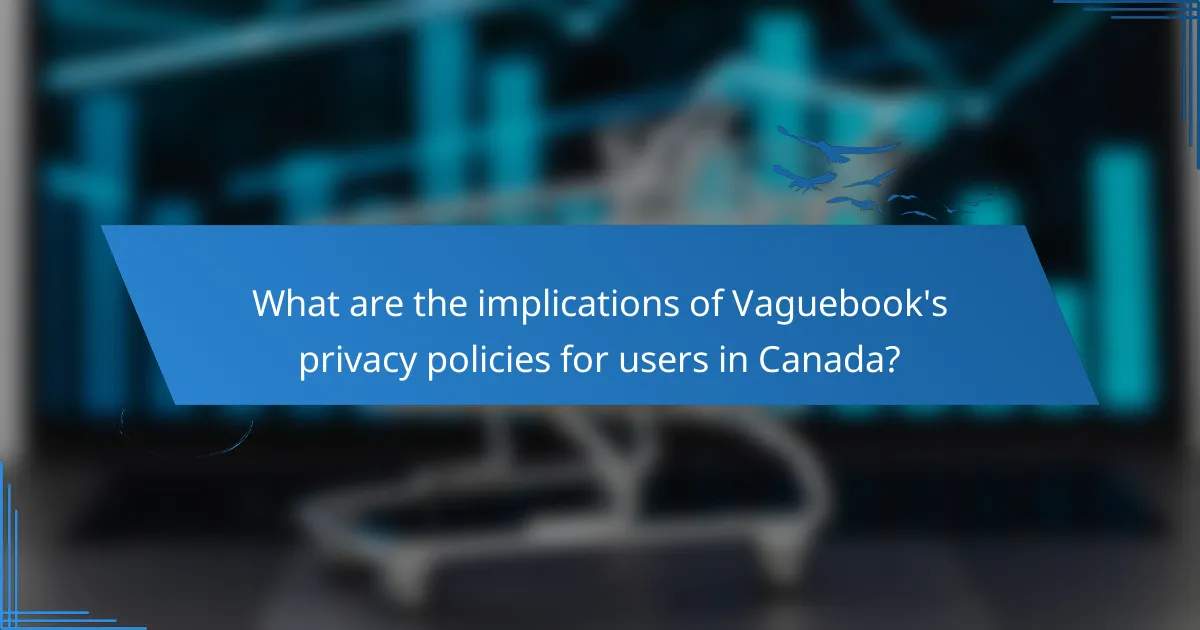Vaguebook’s privacy policies in Canada emphasize transparency, ensuring users are well-informed about how their data is collected, shared, and safeguarded. By prioritizing clear communication and straightforward language, Vaguebook empowers individuals with essential rights, such as access to their personal data, the ability to request deletion, and options for data portability.

What are the key privacy policies of Vaguebook in Canada?
Vaguebook’s privacy policies in Canada focus on transparency regarding data handling, user consent, and individual rights. Users should understand how their information is collected, shared, and protected under Canadian privacy laws.
Data collection practices
Vaguebook collects various types of data, including personal information, usage statistics, and location data. This information is gathered through user interactions, such as posts, messages, and profile details. Users should be aware that data collection can occur even when they are not actively using the platform.
To mitigate concerns, users can review the specific types of data collected in Vaguebook’s privacy policy. This can help in understanding what personal information is shared and how it may be used.
User consent requirements
Vaguebook requires explicit consent from users before collecting or processing personal data. Users must agree to the terms outlined in the privacy policy when they create an account or use the platform. This consent must be informed, meaning users should clearly understand what they are agreeing to.
Users can withdraw their consent at any time, but they should note that this may limit their ability to use certain features of the platform. Regularly reviewing consent settings can help users maintain control over their data.
Data sharing policies
Vaguebook shares user data with third parties for various purposes, including advertising and analytics. The platform may also share information with affiliates or in compliance with legal obligations. Users should be cautious about the extent of data sharing and its implications for their privacy.
To manage data sharing, users can adjust their privacy settings within the platform. Understanding which third parties have access to data can help users make informed decisions about their privacy.
User data rights
In Canada, users have specific rights regarding their personal data, including the right to access, correct, and delete their information. Vaguebook must comply with these rights, allowing users to request changes or deletions of their data as needed.
It is advisable for users to familiarize themselves with these rights and how to exercise them. Keeping records of requests can also help in tracking the status of data rights inquiries.
Policy updates and notifications
Vaguebook is obligated to notify users of significant changes to its privacy policies. Users should regularly check for updates, as these changes can affect how their data is handled. Notifications may be sent via email or through the platform itself.
Staying informed about policy updates is crucial for users who want to maintain their privacy. Users should consider setting reminders to review the privacy policy periodically to ensure they are aware of any changes that may impact their data rights.

How does Vaguebook ensure transparency in its privacy policies?
Vaguebook prioritizes transparency in its privacy policies by providing clear access to information and using straightforward language. This approach helps users understand how their data is collected, used, and protected.
Privacy policy accessibility
Vaguebook makes its privacy policy easily accessible by placing it prominently on its website and within the app. Users can find it in the footer of the homepage and in the settings menu, ensuring that it is just a click away.
Additionally, Vaguebook allows users to download the privacy policy as a PDF for offline review. This feature caters to users who prefer to read documents at their convenience.
Clear language usage
The language used in Vaguebook’s privacy policy is designed to be clear and understandable. Legal jargon is minimized, and complex terms are explained in simple words, making it easier for users to grasp their rights and the company’s practices.
For instance, Vaguebook defines key terms like “personal data” and “cookies” in layman’s terms, helping users comprehend the implications of their data sharing. This clarity fosters trust and encourages informed decision-making.
Regular transparency reports
Vaguebook publishes regular transparency reports that detail data requests from governments and other entities. These reports are released quarterly and provide insights into how often user data is accessed and under what circumstances.
By sharing this information, Vaguebook demonstrates its commitment to user privacy and accountability. Users can see how their data is handled and understand the company’s stance on privacy issues.

What user rights are protected under Vaguebook’s privacy policies?
Vaguebook’s privacy policies protect several key user rights, ensuring individuals have control over their personal data. These rights include access to personal data, the ability to request data deletion, and the option for data portability.
Right to access personal data
The right to access personal data allows users to request and receive information about the data Vaguebook holds on them. This includes details on what data is collected, how it is used, and who it is shared with.
To exercise this right, users typically need to submit a formal request through Vaguebook’s designated channels. Responses are usually provided within a month, but this can vary based on local regulations.
Right to data deletion
The right to data deletion enables users to request the removal of their personal data from Vaguebook’s systems. This right is often referred to as the “right to be forgotten” and is crucial for users who wish to limit their digital footprint.
To initiate a deletion request, users should follow the specific procedures outlined in Vaguebook’s privacy policy. It’s important to note that certain data may be retained for legal or compliance reasons, even after a deletion request is fulfilled.
Right to data portability
The right to data portability allows users to obtain their personal data in a structured, commonly used format and transfer it to another service. This empowers users to switch platforms without losing their information.
When exercising this right, users should ensure they specify the format they prefer, such as CSV or JSON. Vaguebook is generally required to comply with such requests within a reasonable timeframe, typically around one month.

How does Vaguebook compare to other social media platforms in terms of privacy?
Vaguebook’s privacy policies differ from other social media platforms by emphasizing minimal data collection and user control over personal information. While many platforms collect extensive user data for advertising, Vaguebook aims to provide a more transparent experience with fewer data-sharing practices.
Comparison with Facebook privacy policies
Facebook’s privacy policies are known for their complexity and extensive data collection practices. Users often find it challenging to navigate the settings, leading to unintentional sharing of personal information. In contrast, Vaguebook simplifies privacy settings, allowing users to easily manage their data preferences without overwhelming options.
Facebook frequently updates its privacy policies, which can lead to confusion among users regarding their rights. Vaguebook, however, maintains a more stable policy framework, ensuring users are consistently informed about their privacy rights and how their data is used.
Comparison with Instagram privacy policies
Instagram, owned by Facebook, shares similar privacy concerns, particularly regarding user data for targeted advertising. Users may feel their information is heavily monitored and utilized for commercial purposes. Vaguebook takes a different approach by prioritizing user consent and limiting data usage for advertising.
While Instagram offers various privacy settings, many users still struggle to understand the implications of their choices. Vaguebook’s straightforward privacy policy aims to enhance user comprehension and control, making it easier to protect personal information.
Comparison with Twitter privacy policies
Twitter’s privacy policies focus on real-time data sharing and user engagement, often resulting in extensive data collection for analytics and advertising. This can lead to concerns about user privacy and data security. Vaguebook, in contrast, limits data collection and emphasizes user autonomy over personal information.
Twitter allows users to adjust privacy settings, but the options can be confusing and may not fully prevent data sharing. Vaguebook’s user-friendly interface and clear privacy guidelines help users feel more secure in managing their information, reducing the risk of unintended exposure.

What are the implications of Vaguebook’s privacy policies for users in Canada?
Vaguebook’s privacy policies significantly affect users in Canada by determining how their personal information is collected, used, and shared. Users should be aware of their rights regarding data access, consent, and the potential risks associated with vague or unclear privacy statements.
Impact on user trust
The clarity and transparency of Vaguebook’s privacy policies directly influence user trust. When users feel uncertain about how their data is handled, they may become hesitant to engage fully with the platform. This lack of trust can lead to decreased user engagement and a reluctance to share personal information.
To build trust, Vaguebook should provide clear, straightforward explanations of their data practices. Users are more likely to feel secure when they understand what data is collected and how it will be used.
Legal compliance in Canada
In Canada, privacy laws such as the Personal Information Protection and Electronic Documents Act (PIPEDA) require organizations to be transparent about their data practices. Vaguebook must comply with these regulations, ensuring that users are informed about their data rights and the purposes for which their information is collected.
Failure to comply with Canadian privacy laws can result in significant penalties, including fines and reputational damage. Users should familiarize themselves with their rights under PIPEDA, such as the right to access their personal information and request corrections if necessary.

What frameworks exist for evaluating Vaguebook’s privacy practices?
Several frameworks can be used to assess Vaguebook’s privacy practices, focusing on user rights, data protection, and transparency. These frameworks provide guidelines for evaluating how effectively Vaguebook manages user data and safeguards privacy.
Privacy by Design framework
The Privacy by Design framework emphasizes integrating privacy into the development process from the outset. This proactive approach ensures that privacy considerations are embedded in the technology and business practices of Vaguebook.
Key principles include anticipating and preventing privacy risks, ensuring user consent is prioritized, and incorporating strong security measures. For instance, Vaguebook could implement data encryption and anonymization techniques to protect user information.
When evaluating Vaguebook’s adherence to this framework, consider whether privacy measures are visible and accessible to users. Regular audits and user feedback can help identify areas for improvement and ensure compliance with privacy standards.
